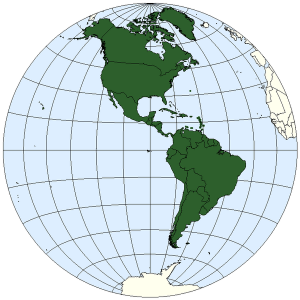Measles in Brazil and the US suggests immunization rates dropped
Recent measles outbreaks in the United States and Brazil suggest that immunization rates in some areas have dropped below levels needed to prevent the spread of cases imported into the Americas, Pan American Health Organization/World Health Organization (PAHO/WHO) experts said today.

Western hemisphere map
Public domain image/ E Pluribus Anthony
"Thanks to high levels of immunization, the Americas have been on track for more than a decade to be formally declared free of measles," said Dr. Cuauhtemoc Ruiz, head of PAHO/WHO's immunization program. "Maintaining high levels of vaccine coverage is key to preventing and halting outbreaks and to protect our populations from the constant threat of imported cases."
Measles has been considered eliminated from the Americas since 2002, due to the absence of endemic transmission of the disease. An international verification committee has been compiling evidence to support a formal declaration of the region as measles-free. This would make the Americas the world's first region to eliminate measles, in line with its similar achievements in eliminating smallpox in the 1970s and polio in the 1990s. Currently the region is also on track to be certified as free of rubella.
All these achievements have been the result of the region's success in achieving high levels of immunization, through routine immunization programs and mass vaccination campaigns such as the annual Vaccination Week in the Americas, which PAHO/WHO has spearheaded for the past 13 years .
Now, measles elimination "is facing major challenges, with several ongoing importations of measles in some countries," PAHO/WHO said in an epidemiological alert distributed yesterday to member countries across the region. The alert urges countries to strengthen measles surveillance activities and to "take appropriate measures to protect residents in the Americas against measles and rubella."
The PAHO/WHO alert reports a total of 147 confirmed measles cases in four countries of the Americas this year, up to February 8. Of that total, 121 cases were in the United States, linked primarily to an outbreak that began at Disneyland in California last December. A single case in Mexico was also tied to that outbreak. Of the remaining cases, 21 were in Brazil and four were in Canada.
The cases in Brazil are part of a larger outbreak that began in early 2013, which has sickened more than 700 people in 31 municipalities.
Between 2003 and 2014, the Americas registered a total of 5,077 imported measles cases, most of them in 2011 (1,369) and (1,848).
"Countries in the Americas have reported cases imported from other regions every year during the past decade, but until recently, they did not lead to significant outbreaks," said Ruiz. "The current outbreaks point to gaps in immunization that could allow measles and other vaccine-preventable diseases to take hold again and begin spreading in our hemisphere."
Measles vaccine has been used for more than 50 years and has proven to be safe and effective. Globally, measles vaccine prevented an estimated 15.6 million deaths between 2000 and 2013.
PAHO/WHO recommends that children receive two doses of measles-containing vaccine before their fifth birthday and that levels of coverage with two doses be maintained at 95% or more to prevent the spread of imported cases. Currently, an estimated 92% of 1-year-olds in the Americas receive a first dose of measles vaccine.
In view of the recent outbreaks, PAHO/WHO is also urging health authorities in its member countries to:
- Maintain high levels of measles vaccination coverage at the national and local levels.
- Advise travelers going to regions that have measles circulation to be sure they are current on their measles vaccines. (This does not apply to infants under 6 months of age, who should not be vaccinated.)
- Inform travelers of measles symptoms and what they should do if they suspect they have the disease.
- Require proof of measles immunity from workers in the healthcare sector (including medical, administrative and security personnel), and advise tourism and transportation personnel to be fully immunized.
- Sensitize private sector health personnel on the need to immediately report any suspected cases.
- If imported measles cases are detected, conduct contact tracing and, depending on contacts' travel history, inform health authorities abroad about the possible location of contacts in their countries.